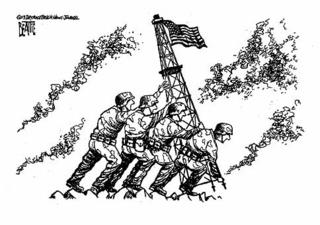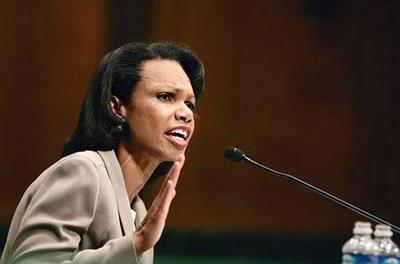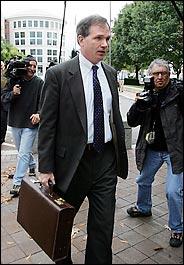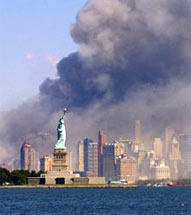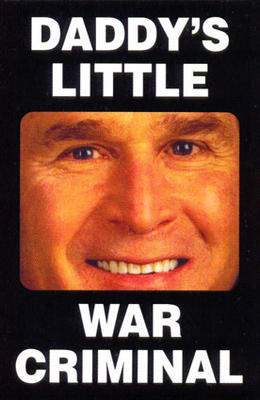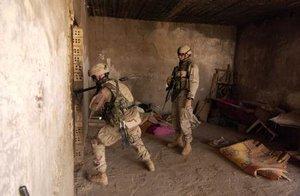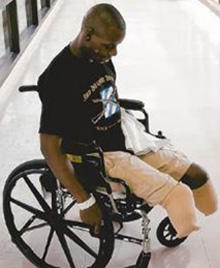 Go to Original
Go to OriginalBy Stewart Nusbaumer
Intervention Magazine
Thursday 20 October 2005
Inside Walter Reed Army Hospital is the horrible reality of the Iraq War, a reality that few Americans see, and fewer want to see.
Washington, DC - In the dining hall is a family of three. The mother's shirt says "Thank a Soldier," the father's hat says "Vietnam Veteran," and the son's T-shirt says "Seattle Sonics." A normal family, except the son has no legs.
The tough talking lions of the Bush Administration proclaimed "shock and awe" would destroy the Iraqi will to fight and then it would be a simple "cakewalk." So the cocky civilians unleashed the "mother" of all air assaults on Baghdad and then our strutting commander in chief - decked out in a fine flight suit - proclaimed, "Mission Accomplished."
But the flight-suit President dodged the Vietnam War, hiding in the Air National Guard's "Champagne Unit," strongly supporting the war from Texas. The Vice-President "had other options," although he insisted other Americans had no option but to fight the war. The Secretary of Defense enrolled in Princeton University instead of the Korean War; after the war he enrolled in the Navy. All the hawkish Neocons were too busy arguing for the Vietnam War to actually fight in that war. Shame, they missed their "noble" causes. So when it came to Iraq, none of these men had a clue about the will to fight.
I see in the halls of Walter Reed hospital soldiers with leg braces and neck supports, soldiers with faces slashed by bombs and stitched up by doctors. Soldiers with legs terribly mangled, soldiers with no legs - amputees with short stumps, with long stumps, without any stumps since entire limbs are missing. A man walks by without an arm. I suddenly travel back in time to another war, to another hospital when I was one of those young men without a limb. But the human carnage and waste in Walter Reed is too overwhelming to escape for more than a flash of time.
At the Army's flagship medical facility, where thousands of wounded soldiers pass through, there is no political spin, no media filter, no presidential lies, and no patriotism without cost as there is in America. There are only the wounded and mangled from Iraq. There is the ground zero for ugly war reality. For these men and women there was no safe "Champagne Unit," no other options, no Ivy League hiding, no just talking while others did the fighting. At Walter Reed there are no Chickenhawks.
Dining Made Difficult
In the large dining room, mothers prepare their son's food, applying ketchup to hamburgers, cutting pork chops, raising tables for their wheelchairs to clear. Fathers mostly sit with slight smiles on their faces. The conversations are mundane, and sedate. Talk about family, talk about the weather, talk about the future. Recuperating from serious wounds is slow so it's best not to go too far into the future.
In a wheelchair, a young man who barely looks 17 years old rolls by with a pair of ugly "road kill" legs - the spaghetti I'm eating rumbles in my stomach - followed by a soldier on crutches, doing a Frankenstein walk with stiff legs thrown outward. Several tables away, a slightly older soldier, in his early 30s, with a nasty looking scarred leg propped up on a chair, rubs his fingers over the smooth surface of his Purple Heart Medal. This is the medal given for combat wounds, to everyone wounded by enemy fire. This is the medal that delegates at the Republican Party mocked.... I need some fresh air.
In front of the hospital a man in his mid-20s sits down on the bench next to me. His right leg is bloated to at least double its normal size. Most of the top layer of skin had been removed, it's raw reddish. Puss glistens in the sun light, or maybe it's some kind of ointment.
"Looks like you had a bad day," I wisecrack gently.
"Yeah," he snickers.
"An IED?" (Improvised Explosive Device, roadside bomb or land mine.)
"Nope, bullet, it splattered bone."
The sergeant has been back from Iraq since January, nine months in Walter Reed, and his leg remains ugly looking. It will probably always be ugly looking. But in Walter Reed looks mean nothing, what matters is walking. I remember my obsession to walk, an obsession that overcame the pain and the blood, anything to be able to walk again. And the sergeant is walking, with crutches. But I doubt this sergeant will do much walking in his lifetime.
Sometimes it's best to just cut the leg off, but doctors can not always do what is best. The sergeant stands up, struggles to walk five feet, stops for a rest. He looks over his shoulder and says, "I'll make it, I have to make it."
"Yes you will," I say, knowing clearly that as the years pass his walking will become even more difficult, until there is no walking. All this sergeant from North Carolina ever wanted was a normal life, with a normal family, a boy and a girl. A smile broke his straight face when he said, "a boy, and a girl." But his normal life is gone and all he has is the dream of returning home to North Carolina, and hopefully that boy and girl.
The Rules of War
In America's shock and horror at Walter Reed there are rules. I will give you the four that I believe are most important.
Rule 1: talk to the person and not to the wound. This can be difficult in the beginning since ugly wounds tend to overwhelm. But the bearer of ugly wounds remains much more than a wounded person, and this you need to respect. You can ask about the wound, but you cannot talk to only the wound.
Rule 2: allow wounded soldiers to do what they can do themselves. Give them the space and the opportunity to have control over their lives, even when severely dependent upon other people.
When I was in Bethesda Naval hospital in the late 1960s, leg amputated and bed ridden, frustrated with my constant dependence on others, a visitor asked me for a cigarette - in those days you could smoke right in the hospital - and I was ecstatic to hand him one. It felt great to do something on my own, in this case hand another human being an simple item.
Rule 3: forget your moral questions about the war. Morality is for those who support the war and for those who oppose the war, not for those in the war. Those seriously wounded are still fighting the war so clam up about the immorality of this stupid war.
A corollary to this rule is never protest against a war in front of a military facility, especially a military hospital. That is a no-brainer. You demonstrate against those who made the policy to go to war, not against those who are sworn to carry out the order to go to war.
Rule 4: don't assume this is a sad time for these recuperating men. For most their physical pain is receding or is being managed by drugs, and the true mental anguish has yet to sink in. They are focused on their future which after a close call with death looks darn rosy.
"Hey, man how you doing?" a soldier greets another stepping into the elevator.
"Great," he replies. I notice out of the corner of my eye he is missing a chunk of his cheek, it's ugly.
"Guess what, man? Smithy's coming up!"
"Really?"
"Yeah, he's driving up this weekend."
"That's great, man."
This is the spirit that America sees when it sees anything of these wounded soldiers. It makes Americans feel good, proud of their country, confident about their military. But it is only part of the truth. There is a hidden truth. It is ugly.
The "For What" Questions
With spirits high - hey, they just "cheated" death - surrounded by fellow soldiers day and night, with family and friends visiting and attentive, life is not bad. But this is the easy middle, coming after the initial shock of being seriously wounded and before the tortuous work of transforming one's identity to accept the new reality. The easy middle is relatively easy.
When discharged from the hospital, their tight support network disappears and the strong optimism in the wake of a close call begins to wane. There is now time and space to think, and to ask questions. Sitting alone in an apartment, probably a spartanly furnished apartment, maybe in a dingy bar with their back against the wall, the questions start. They always do, for those severely wounded. Those "for what" questions: for what do I have to put on an artificial limb every morning? For what must I live with this horrible pain every day? For what did my buddy die? For what was all the horror for?
Some will attempt to evade these questions, but that's not possible. They paid too high a price. Some will turn to stock replies, such as, "It was for God, country, and family." To the degree this works is the degree that they cut themselves off from reality. Vietnam was not for God, America, and family, and neither is Iraq. Most of the wounded will learn this, and then they will demand a real answer to, "For what?"
The only satisfactory answer is for defense of country. Nothing else justifies the sacrifices, sacrifices Americans quickly forget but endure a lifetime for these men and women. The other answers, to rebuild another country, to stay the course so others won't perceive America as weak, to fulfill a president's fantasy of a great legacy, to fill our vehicles' gas tanks, to save the world from the latest new evil, they cannot withstand the ugly questions that come from horror and suffering. "For what?" is too strong for weak answers.
Barbara Porchia, whose son Jonathan was killed in Iraq, said if he had died in Afghanistan that would have probably been easier to accept - still horribly difficult, of course, but easier than Jonathan dying in the worthless Iraq War. In defense of country is the only justification for our dead and wounded soldiers and marines, nothing else is acceptable in the long run. Nothing else is ever acceptable.
I am walking through Ward 57, the amputee ward, walking on the 5th floor. There are grisly sights here. Sights that the dinning room and outside benches do not want to see, that I do not want to see. Bodies wrapped in blood soaked bandages. Eyes covered in agony. Nurses' huddled over broken bodies. The air is thick on the 5th floor, hard to breath. The flag of patriotism is less intensely displayed here. The pain of war is stronger. I feel a deep anger at America rising in me. Then I see - I walk quickly, I need some fresh air.
But at Walther Reed, ground zero for ugly war, there is no break from horror. A young man sits down on the bench next to me - "blew the lower part of my leg off ... an IED ... getting my first leg next week ... going to college when I get out ... girl friend visits...."
Whether the "For what?" is answered with a closed mind, or with an honest answer, many seriously disabled veterans will in time turn bitter and cynical. But others will swallow hard, refusing to let the injustice crush them, and move on in life. But all will be deeply scarred. If their sacrifices were truly for the defense of our country, that helps a lot. That cause can justify the sacrifices, but an unworthy cause justifies nothing.
A veteran with Iraq Veterans Against the War recently commented that after the guys return home and realize that on the home front Americans barely cared about the war, that here patriotism is an empty gesture because no one sacrifices anything, they will become angry.
To this day, some 38 years later, when I hear someone on the radio discuss the World Series in 1967, or some similar remark about 1967, I cringe. That was the year I was fighting in Vietnam. That was the year thousands of young Americans were dying and losing limbs and their minds for, supposedly, their country. But our country was excited about the World Series, and.... If a war is important enough for soldiers to be maimed and to die for, it is important enough for all Americans to sacrifice something. Something!
The World Series of baseball should have been cancelled in 1967, as it should be cancelled today, because America has young men fighting in a war.
But Americans are barely paying attention and would refuse to give substance to their patriotism, a clear indication this is not a war for the defense of America. We have an administration that won't fully fund veterans' health care, while it does not properly equip our troops in war. And we are a people not insisting our veterans have adequate health care and our soldiers have proper equipment. This is wrong, America. Wrong to those with "road kill" legs, wrong to those with partial faces, wrong to those with missing limbs.
I stand up from the bench, it's hard for me to sit for too long, and it's hard for me to walk for very far. Instead of returning to the 5th floor, I return to my car. Driving through the gate of Walter Reed and onto Connecticut Avenue - a cab whizzes by, a speeding van honks, a couple on the sidewalk hugs - my head shoots back as pain rips through my stump, just as fast it leaves. But I know the pain will be back. This is for a lifetime. What's inside Walter Reed is also for a lifetime.
--------------------------------------------------------------------------------
Stewart Nusbaumer is editor of Intervention Magazine. You can email Stewart at
Stewart@interventionmag.com.
Link HereLink Here


